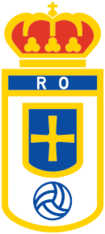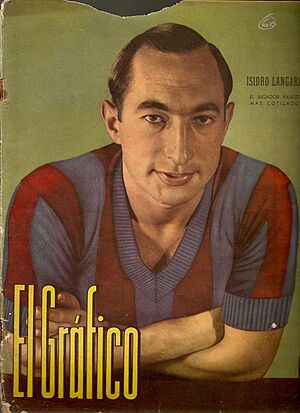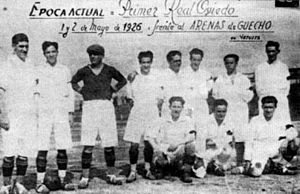Real Oviedo facts for kids
 |
||||
| Full name | Real Oviedo, S.A.D. | |||
|---|---|---|---|---|
| Nickname(s) | Carbayones, Los Azules (The Blues), Los Godos (The Goths), Oviedistas (Supporters) |
|||
| Founded | 26 March 1926 | |||
| Ground | Estadio Carlos Tartiere | |||
| Capacity | 30,500 | |||
| Owner | Grupo Pachuca (51%) Grupo Carso (20%) Others (29%) |
|||
| President | Martín Peláez | |||
| Head coach | Veljko Paunović | |||
| League | Segunda División | |||
| 2022–23 | Segunda División, 8th of 22 | |||
|
||||
Real Oviedo (in Asturian: Real Uviéu) is a professional football club from Spain. It is based in Oviedo, Asturias. The club was started on March 26, 1926.
Real Oviedo plays in La Liga, which is the top football league in Spain. They recently earned their spot there by winning the Segunda Division promotion playoffs. The team plays its home games at the Estadio Carlos Tartiere. This stadium opened on September 30, 2000. It is the biggest sports stadium in Asturias. Real Oviedo has played 38 seasons in the top Spanish league. This places them 18th in the all-time league table for La Liga.
The club has a big rivalry with Sporting Gijón. Their matches are known as the Asturian derby.
Contents
Club History
How Real Oviedo Started
Real Oviedo was formed in 1926. This happened when two older clubs, Stadium Ovetense and Real Club Deportivo Oviedo, joined together. Stadium Ovetense was started by young people who learned about football in England. Real Club Deportivo Oviedo was formed later by a group that split from the first club. Carlos Tartiere was the first president of the new club. Just seven years later, Oviedo reached La Liga, the top league.
The "Electric Forwards"
In the early days, Oviedo had amazing attackers. They were Emilín, Galé, Herrerita, and Isidro Lángara. All of them played for the Spanish national team. Along with Casuco and Ricardo Gallart, they were called Delanteras Eléctricas (The Electric Forwards). They played a fast, modern style of football. This was many years ahead of its time. An English coach, Fred Pentland, helped them with strict training.
Isidro Lángara was a star player. He won the Pichichi Trophy (for top scorer) three years in a row before the Spanish Civil War. During this time, Oviedo scored many goals, setting new records. However, the war caused the team to break up. Lángara went to South America, and other players joined different clubs.
Challenges and Comebacks
When football started again in Spain in 1939, Oviedo could not play. Their stadium was damaged because it had been used to store ammunition during the war. For many years after that, the club moved between the first and second divisions. Their best finish was third place in 1962–63. The club also faced a tough time in 1978 when they were relegated to the third division, but they quickly returned.
In 1982, Spain hosted the FIFA World Cup. Because of this, the Carlos Tartiere Stadium was completely rebuilt. The first game there was a 0-0 draw against the Chile national team. In 1985, Oviedo won the Spanish League Cup for second division teams.
Return to the Top League
In 1988, Oviedo returned to the top division. They stayed there for 13 seasons in a row. In 1990–91, they finished sixth. This allowed them to play in a European competition, the UEFA Cup, for the first time. They were knocked out by Genoa C.F.C. from Italy. After that, Oviedo had many good seasons. They sometimes just barely avoided being relegated. In 1992, like most Spanish football clubs, Real Oviedo had to become a public limited sports company.
On October 4, 1995, Real Oviedo played its 1,000th game in La Liga. In 2000, the new Carlos Tartiere Stadium opened. It has 30,500 seats. The official opening match was on September 20, 2000, against Partizan Belgrade.
Financial Struggles and Recovery
After being relegated twice in a row, Real Oviedo faced serious money problems. They could not pay their players. This forced the team to drop all the way to the fourth division for the 2003–04 season. The team almost closed down, but they managed to recover and returned to the third division the next year.
The financial problems continued for several years. In the 2012–13 season, the club asked fans to buy shares to help save it. Some famous footballers who started their careers at Oviedo, like Santi Cazorla, Juan Mata, Michu, and Adrián, also helped by investing their own money. The club needed to raise €2 million to avoid closing.
On November 17, 2012, Carlos Slim, who was one of the richest people in the world, invested $2.5 million in the club. This gave him a major ownership share.
Recent Success
On May 31, 2015, Oviedo returned to the Spanish Segunda División after 13 years. They won their promotion playoff against Cádiz. In the 2023–24 Segunda División season, Oviedo finished sixth. This earned them a spot in the promotion play-offs. They reached the final, winning the first game 1-0, but lost 2-1 overall to Espanyol.
After finishing third in the 2024–25 season, Oviedo earned promotion to La Liga. This was their first time back in 24 years! They beat Mirandés 3-1 in extra time in the promotion play-off final.
- 39 seasons in La Liga
- 42 seasons in Segunda División
- 9 seasons in Segunda División B
- 4 seasons in Tercera División
European History
Real Oviedo has played in European competitions once.
| Season | Competition | Round | Opponent | Home | Away | Agg. |
|---|---|---|---|---|---|---|
| 1991–92 | UEFA Cup | R64 | 1–0 | 1–3 | 2–3 |
Current Squad
|
|
Reserve Team
Real Oviedo also has a reserve team called Vetusta. They play in the fourth level of Spanish football, Segunda Federación.
Players on Loan
|
Club Honours
Real Oviedo has won several titles throughout its history:
- Segunda División (Second Division)
- Winners (5): 1932–33, 1951–52, 1957–58, 1971–72, 1974–75
- Copa de la Liga (League Cup for Segunda División)
- Winners: 1984–85
- Segunda División B (Third Division)
- Winners: 2014–15
- Tercera División (Fourth Division)
- Winners (4): 2003–04, 2004–05, 2007–08, 2008–09
Individual Player Awards
Pichichi Trophy (Top Scorer)
- La Liga: Isidro Lángara (3) (1933–34, 1934–35, 1935–36), Marianín (1972–73)
- Segunda División: Isidro Lángara (1932–33), Lalo (1957–58), Galán (1971–72), Carlos (1987–88), Borja Bastón (2021–22)
- Segunda División B: Miguel Linares (2014–15)
- Tercera División: Diego Cervero (3) (2004–05, 2007–08, 2008–09)
Zamora Trophy (Best Goalkeeper)
- Segunda División: Óscar Álvarez (2) (1931–32, 1932–33), Lombardía (1971–72)
- Tercera División: Rafael Ponzo (2003–04), Oinatz Aulestia (2008–09)
Notable Former Players
Here are some famous players who have played for Real Oviedo:
|
|
Rivalries
Real Oviedo has a strong rivalry with Sporting de Gijón. This is known as the Asturian derby. The two teams have played 117 times. Real Oviedo has won 49 matches, Sporting Gijón has won 38, and there have been 30 draws.
Sporting won the very first match 2-1 in 1926. The first top-league derby was in the 1944–45 season. Oviedo won at home, but lost badly away. The last top-league derby was on March 15, 1998. Oviedo won 2-1 and managed to stay in the league.
Supporters
Real Oviedo fans are very loyal. When the club was relegated to the fourth division in 2003–04, they set a record for season ticket holders in that league, with 10,759 fans. They also set records for attendance at games. For example, 16,573 people came to a fourth division game against Oviedo ACF. A promotion playoff game against Mallorca B had 27,214 fans!
In the 2023–24 season, Real Oviedo reached a new record with 21,517 season ticket holders. Many fans belong to official supporters' groups called "peñas," which are organized by APARO. The most dedicated fan group is called Symmachiarii.
Real Oviedo supporters are also friendly with fans from other clubs. These include Deportivo La Coruña, Real Valladolid, Sevilla, and international clubs like Genoa, Apollon Smyrnis F.C., and Žilina.
Real Oviedo (Women's Team)
Real Oviedo also has a women's football team. On August 28, 2017, the women's club Oviedo Moderno CF joined Real Oviedo. They started using the Real Oviedo name and the club's blue and white colors. The women's team currently plays in Segunda Federación, which is the third tier of Spanish women's football.
Images for kids
See also
 In Spanish: Real Oviedo para niños
In Spanish: Real Oviedo para niños
 | James Van Der Zee |
 | Alma Thomas |
 | Ellis Wilson |
 | Margaret Taylor-Burroughs |




